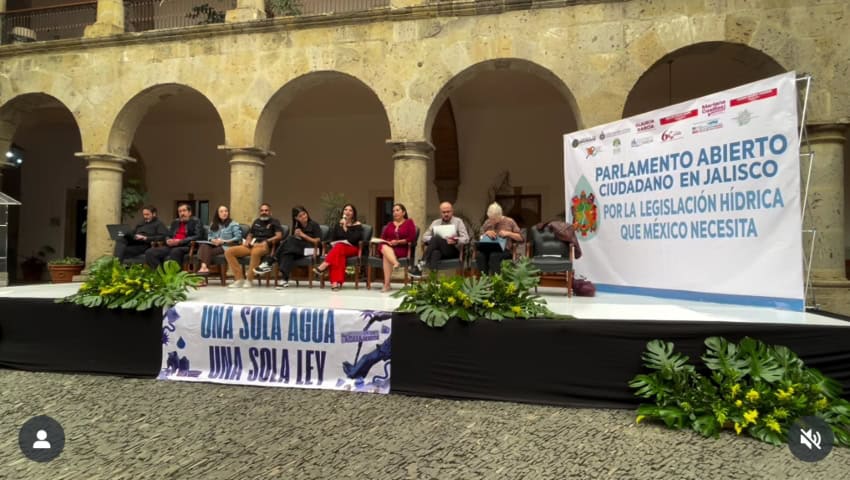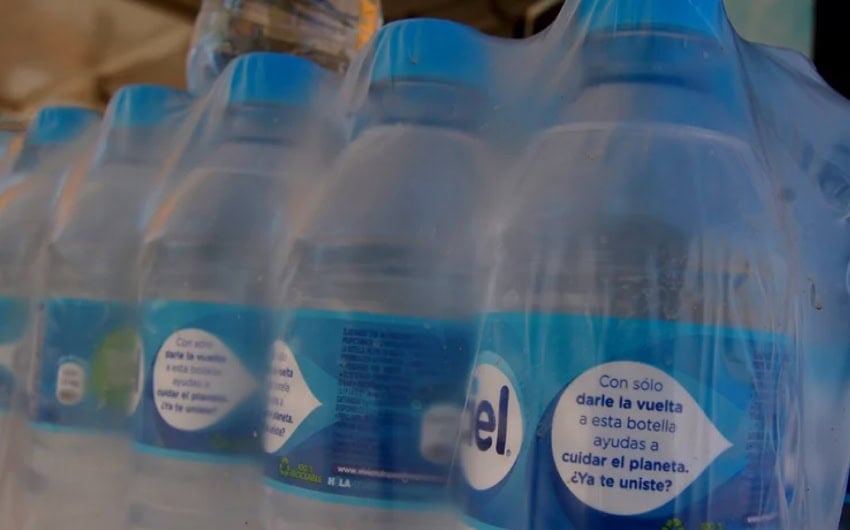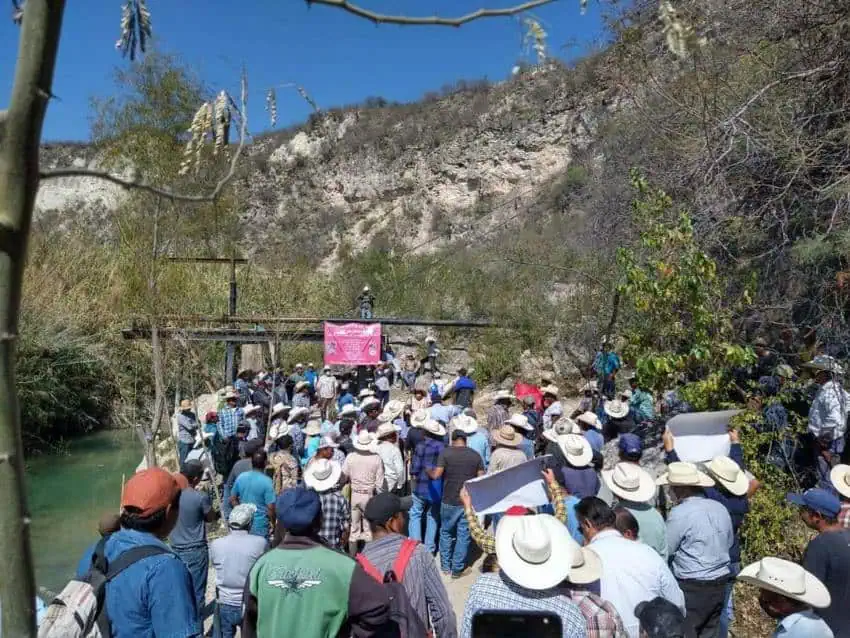Inside the colonial-style courtyard of the Jalisco State Congress, the voices of farmers, scientists, activists and lawmakers echoed through the arched porticos. They had gathered from the far corners of one of Mexico’s most sprawling, populous and economically powerful states — and beyond — to weigh in on Mexico’s new water policy.
The “Parlamento Abierto por el Agua” — Open Water Parliament — convened on Nov. 7, bringing together a diverse citizenry under the banner “Una sola agua, una sola ley” (One Water, One Law). Their message was clear: Water must no longer be treated as a private commodity.
Mexico’s new water laws

Referring to the pair of water laws proposed by the Sheinbaum administration and now making their way through Congress, María González Valencia, director of the Mexican Institute for Community Development (IMDEC) and a national coordinator of the Jalisco Water Defense Movement, didn’t mince words.
“The law they’re proposing is a simulation,” she said. “It keeps the old privatizing structure intact and treats water as a market, not a human right.”
A mandate ignored
In 2012, Mexico amended its Constitution to recognize the human right to water and sanitation, ordering Congress to enact a new General Water Law within 360 days. Thirteen years later, that law still doesn’t exist.
“In 2012, the human right to water and sanitation was recognized … and Congress was given 360 days to issue a new General Water Law,” González said in an interview. “It’s now 2025 — 13 years have passed — and this new law still hasn’t materialized.”
For González, the delay reflects the power of entrenched economic interests — what activists call “la hidromafia“ — the consortium of industrial, agricultural and political elites that have long profited from exclusive water concessions.
“In Mexico, a single concession can let a company control water for generations,” she said. “Families spend a large part of their income buying bottled water, because neither public nor private systems guarantee safe drinking water.”
The ‘finger of God’ and two laws

At the Parliament’s legal forum, veteran water defender Elena Burns, co-founder of Agua para Tod@s, Agua para la Vida, warned that the federal government’s draft law violates both the Constitution and common sense.
“The finger of God points down and they come with two laws — perpetuating the old Salinista water law,” she said with characteristic irony. “They just stick a General Water Law to the side with a bit of chewing gum — a wish list with no means of enforcement.”
The draft now before Congress was prepared by CONAGUA, Mexico’s National Water Commission, the federal agency long criticized for favoring industrial and agribusiness interests. Its proposal would keep the 1992 National Water Law in place while creating a second “General Water Law” focused on broad policy goals.
“The CONAGUA initiative violates what the Constitution establishes,” Burns added. “By splitting the law in two, it keeps intact the old concession system — precisely what must change.”
‘One water, one law’ is no slogan
Constitutional scholar Rodrigo Gutiérrez Rivas of UNAM’s Institute for Legal Research called the federal plan “clearly unconstitutional.”
“‘One water, one law’ — more than a slogan, it’s an unequivocal constitutional mandate,” he said. “Congress was given 360 days to issue a General Water Law. As simple and straightforward as that.”

Miguel Ángel Montoya, a legislative adviser to the Citizen Water Law Initiative, reminded the audience that the clock has been running since 2012:
“Thirteen years later, that mandate is still being ignored.”
What privatization looks like
González pointed to everyday realities that expose Mexico’s water inequities. Industrial agribusiness and mining operations enjoy concessions lasting up to 30 years, renewable indefinitely. Municipal utilities in states such as Puebla and Coahuila have been privatized. And urban consumers, distrustful of tap water, spend billions annually on bottled brands — often owned by the same corporations extracting groundwater.
“Water has been turned into an economic asset,” she said. “This model deepens social inequality and environmental destruction. We need to shift from a water market to a water commons.”
A crisis made in Jalisco
In her home state, González added, the stakes are visible everywhere:
“Jalisco is living a water crisis,” she said. “We have toxic contamination, degraded ecosystems and policies that still treat infrastructure as the solution.”
From the poisoned Santiago River to vanishing aquifers in Los Altos and megaprojects that channel water toward Guadalajara’s sprawl, citizens say the crisis mirrors a national pattern of extraction without accountability.

Mariana Casillas Guerrero, a federal deputy from Jalisco, told participants the new bill risks cementing that pattern.
“We must ask to what extent this reform truly breaks with the extractivist model of concessions and privileges for a few,” she said. “It still allows decades-long permits that loot nature and the peoples. Water is the memory of the peoples — the material foundation of any project of social justice.”
From the ground up
In a breakout session on acaparamiento (water hoarding), agronomist Martín Gómez García of the Network of Democratic Agronomists described how large avocado and berry plantations continue operating “without permits, depleting aquifers and displacing small farmers.”
Participants demanded publication of a full list of concession-holders delinquent on their fees and urged that new permits be conditioned on sustainable use. Others proposed regional water councils with citizen participation to monitor local supply, and mandatory rain-harvesting systems for public buildings to reduce pumping from Lake Chapala.
At the national scale, Agua para Tod@s and allied networks have documented more than 28,000 community-run water systems — from rural collectives to urban neighborhood committees — managing, purifying and distributing their own water.
“These are systems where neighbors manage, purify and distribute their own water,” González said. “They’re the heart of water democracy in Mexico.”

Burns agreed that any real reform must recognize those systems. “They are already practicing what the law should protect,” she said during the forum. “That’s where the right to water truly lives.”
Toward a national reckoning
Across Mexico, similar citizen Parliaments are unfolding — in Puebla, Torreón, Oaxaca and the Valle de México — all demanding that Congress scrap the 1992 law and pass a single, enforceable framework guaranteeing equitable access.
In Jalisco, legislators pledged to do their part.
Federal deputies Claudia García Hernández and Mariana Casillas Guerrero vowed to take the Jalisco resolutions to the national Chamber of Deputies, while state deputies promised to pass a formal resolution urging their federal counterparts to consider them.
The debate that began in Jalisco continued in Mexico City last week, where the Chamber of Deputies held a series of public hearings on the proposed General Water Law. Lawmakers and civil society groups — including Agua para Tod@s and the Jalisco delegation — presented their positions, calling for a single, enforceable law to guarantee the human right to water.
Still, González warned, the political and economic pressures are enormous.

“It’s an unequal battle,” she said, “but one filled with hope — because people everywhere are organizing to put water for life, not for profit, at the center of our future.”
‘To defend water is to defend life itself’
For Deputy José Luis Sánchez González, who closed the Jalisco Parliament, the struggle over water is ultimately about moral choice.
“When we speak of something as vital as water, it’s worth asking who is truly willing to defend it,” he said. “Today we are speaking of defending life itself through a resource as vital as water.”
Tracy L. Barnett is a freelance writer based in Guadalajara. She is the founder of The Esperanza Project, a bilingual magazine covering social change movements in the Americas.
